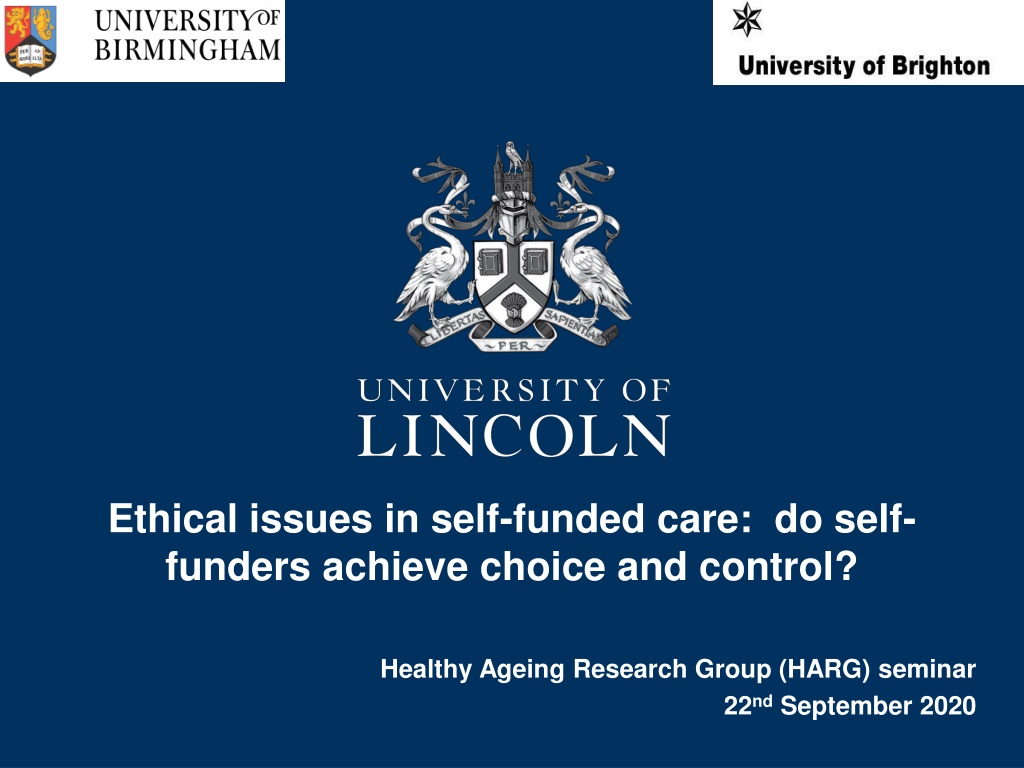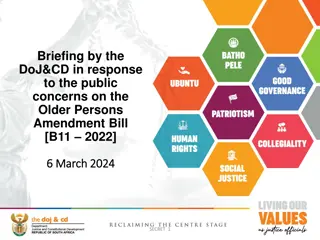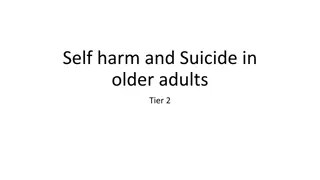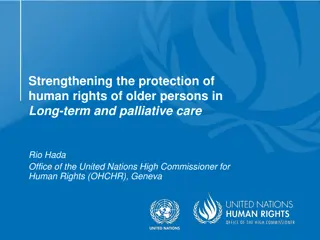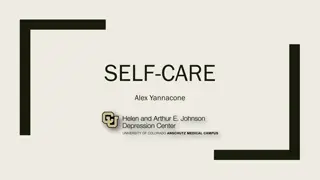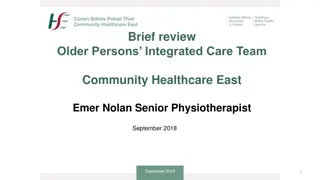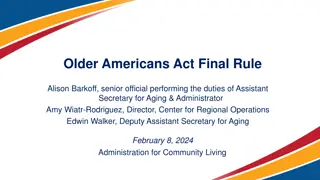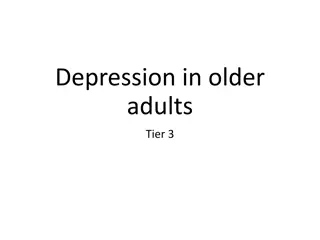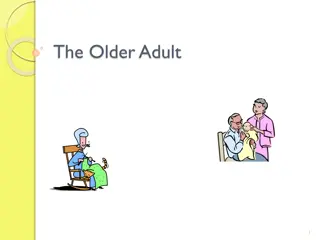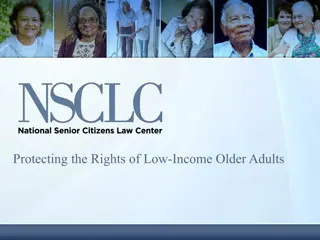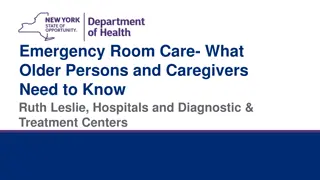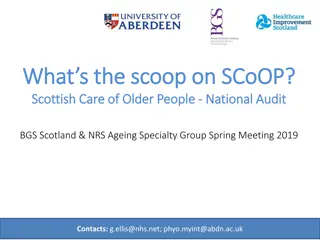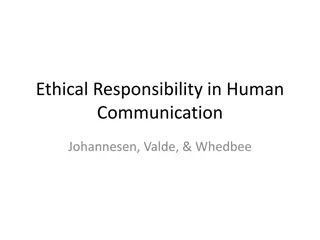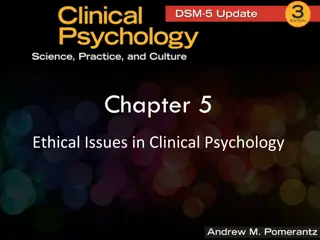Exploring Ethical Issues in Self-Funded Care and Co-Producing Knowledge with Older People
This research delves into the ethical dilemmas surrounding self-funded care for older individuals, investigating how care relationships are navigated and the risks involved. Through in-depth interviews and collaboration, the project aims to shed light on the dynamics of self-funding in care provision and its implications on stakeholders. The study also emphasizes co-production of knowledge with older individuals to enhance understanding and inform service provision.
Download Presentation

Please find below an Image/Link to download the presentation.
The content on the website is provided AS IS for your information and personal use only. It may not be sold, licensed, or shared on other websites without obtaining consent from the author. Download presentation by click this link. If you encounter any issues during the download, it is possible that the publisher has removed the file from their server.
E N D
Presentation Transcript
Ethical issues in self-funded care: do self- funders achieve choice and control? Healthy Ageing Research Group (HARG) seminar 22ndSeptember 2020
Healthy Ageing Research Group (HARG) Interdisciplinary research Bringing a critical perspective to ageing research Involvement of older women and men and other partners in the research impact Contribute to the development of a sustainable research infrastructure and environment for ageing research
Ethical issues in self-funded care: co- producing knowledge with older people Wellcome Trust collaborative award in Humanities and Social Science Research sites: University of Brighton (Lizzie Ward and Phil Locke); University of Birmingham (Denise Tanner and Phil Le Mesurier) Lincoln with Phoebe Beedell Project underpinned co-production methods; a community partner and a series of knowledge exchange events with stakeholders from the area
Core Research questions How are relationships of care negotiated and managed by: older people who are self-funding, those who may be acting on their behalf (i.e. family, friends or neighbours), front-line care staff and provider organisations? What risks does self-funded care generate for different stakeholders (older people, carers, service commissioners and providers) and how are these managed? What insights can the ethics of care contribute both to understanding care relationships in a self-funding context, and to informing commissioning and service provision?
Fieldwork In depth interviews with older people who self fund their care 3 x 18 months In depth interviews and focus groups with carers who support older people who pay for their own care In depth interviews with stakeholders involved with older people who self fund their care (statutory agencies; care providers; commissioning)
Co-research team Co-research group personal interest, experience and/or work based experience Training / support Building relationships and making decisions Fieldwork and analysis of fieldwork Other activities (Care(less) art project; film; older person s booklet) Presentations (for example, BSG) Evaluation of co-production approaches (Sally Cornish)
What is self-funded care? someone who pays for all of their social care or support from their own private resources (including social security benefits such as state pension or Attendance Allowance), or tops up their residential or domiciliary care funding with additional private spending (Baxter and Glendinning, 2014: 5)
Why is it important Growth in numbers of self-funders impact of austerity and evidence of unmet need Older people the largest group of people who pay for all or part of their care Older people at the margins Lack of information / knowledge about self funders Care Act duties for Local Authorities Numbers of people with increasingy complex needs Social care policy and need for reform
Finding care Assumption: Older people who pay for their own care can draw from a comprehensive range of care options
Finding care (2) I contacted 28 care agencies throughout Lincolnshire and Nottinghamshire, it took me three and a half months to find morning carer through Marigolds... , it was. Either the care agency didn't have enough staff or if they did have enough staff, the staff didn't have enough hours. Or, there wasn't enough hours on offer in order to make that member of staff's trip out here worthwhile or... (LOP 04 T1) Well, I couldn't pick anybody, I relied on the people at the home, and they said, "If you ring Heather Care, they'll come". So they gave you a list to begin with, you tried that? Yeah, and it didn't work. (LOP 09 T1)
Choice and purchasing care Assumption: people who are paying for their own care are able to make a purchase that fits with their lifestyle, needs and aspirations
Choice and purchasing care We ve done well, we re still waiting, yes we do have carers in a morning, we do have carers at tea-time, the idea is to get him up and the idea is to get him ready for bed, well in the morning .they re usually here between 8 and quarter-past, whereas he s out of bed by that time and well over half dressed and nearly ready to come downstairs ..because he s not going to stop in bed before they get here. But the evening ones which down on that thing there it says they should be here at half-past-8 at night, they re here at half-past-6, quarter-to-7 10 past 6 the other day and I sent them home, I said, there s no point in coming at that time, we re having a meal, it s ridiculous (OP 05 T3) if it s going to be half an hour (lunch call), could it be sort of half past twelve to one, that s a sort of normal time and it fits in with my tablets and so on. And that s what I understood it was going to be and then, the next morning when they were going to start, somebody was here about twenty past eleven (LOP 01 T3) We ve had over 70 carers through this door (LOP 12 T2)
Control Assumption: people who pay for their own care will be able to control who cares for them and have a say about their professional boundaries, behaviour, standards
Control Continuity of care / carers Predictability in terms of the quality of care/ support offered Clear and unambiguous communication Combination of positive relationship and carer ability / skill Reliability
Control she s very reliable .she comes at 8 o clock .we paid for an hour and she was and she was coming and going in half an hour but I didn t say anything. And then she said I think we should reduce this to three quarters of an hour , which we did, so we pay now for three quarters of an hour. She still leaves in half an hour but I don t say anything because it cuts both ways, so she ll say to me, can I come at 7.30 today? and I say yes and then I can say to her, could you do a sleepover because I need to be away and she says, yes (LOP 20 T1) Fred doesn t want any Tom, Dick and Harry pushing him in the bathroom and stripping him off, he s just sat there, and he can t do anything about it.... well I have felt uncomfortable for quite a few little things, I mean some of them is overfamiliarity, in fact I ve had it put in the care plan, we re not dear, darling and duck to anybody . It is, you see and I find it overfamiliar, but also I find it quite demeaning, you know, my name, and so I m very forthright, every time it was darling, dear or duck (LOP 12 T2)
Choice Assumption: people who pay for their own care can buy whatever they like
Choice of purchase As long as I can afford it. I don t know, I don't know how many years (wife) has got. No, it takes, it s a big financial commitment isn t it? Oh yes, I mean it s knocked care plans a bit sideways, I mean it, with the cost of their food and keep and reasonable figures, must cost about 130,000 a year. So you know, it s a lot of money. (LOP 18 T3) about the fees, it's over 1000, 1,100 ..so I looked at mum's finances, she inherited some money from a cousin, so she'd got about just over 100,000 actually in savings and a little semi-detached house.....It is just costing an awful lot of money, and I can see the money going down, and God alone knows what happens when the money goes. My mum is physically healthy, though obviously vascular dementia but I can see my mum being over a 100 and still being in there it gives me sleepless nights thinking about it/ )LO6)
Choice of purchase Well it was my choice, and I suppose I'm quite happy to pay for this, as long as I've got enough money, because it does worry me now we've taken on these night carers and Social Services at the moment won't help. I mean we really, when we've worked out all the finances, we're short of up to 200 a month, so I've got to find that from somewhere, and that is worrying. But, because we can't really cut down their hours when you think we've got to pay (LOP 04 T1) the evening carers, they, I won't say they demanded, but they asked for 15 an hour, which I was quite happy about when I thought it included petrol as well, so I pay them 30 a night, and then the morning carer, now she was only getting 9 an hour, so as soon as she knew these evening carers were getting 15, she said 'oh well, I want more than 9', and so in the end we agreed to 12, but she doesn't really, compared to the evening ones, earn her 12, I find extra jobs for her to do, she does ironing and things like that for me. But, no, she demanded more, more, because probably without her having demanded more, I would have been alright financially, but no that's... (LOP 04 T1)
Choice and control? When trying to find or choose care, participants lacked support or a clear pathway to finding care care was often found by accident or via informal contacts rather than being actively chosen In practice, and despite the promotion of choice as a key element of marketised care, choice for self-funders was often very limited. Often, participants took what they could get rather than choosing care based on a range of options In practice, control as a key element of care could be limited or at least involved making active compromises or deciding what to overlook given that exiting the service was not an option - this often involved coping with poor time keeping, challenging professional boundaries, lack of continuity and poor professional practice
Choice and control? The transfer of risk and responsibility to older people purchasing care meant that they had worries and responsibilities associated with budgeting, managing uncertainties associated with changing health and care needs, or services withdrawing or changing which they could do at short notice. Alongside personal care many of the participants managed a wider support network including, cleaners, gardeners, visiting private allied health professionals these were highly valued but also had to be paid for, organised and managed. There was an absence of advice or clear signposting to someone to advise in respect of care decisions and also in terms of financial advice Ultimately, care was valued because it allowed people to remain in their own homes, often a core aspiration which underpinned care purchasing decisions and choices. This included people purchasing very expensive live in care in order to receive 24 hour care but remain at home.
Implications? An urgent need for politicians and policy makers to become more aware of the circumstances of self funders hitherto almost invisible despite being of considerable importance to the care market in terms of their financial contribution and the realities of cross funding Honest acknowledgement of the role that self funders play in current social care funding The issue of so called, catastrophic are costs must be made visible Ethical questions about what is / is not reasonable to expect older people to manage in the context of self-directed care and changing and unpredictable health needs The uncertainties of current care provision and the social care workforce remains a significant concern The general lack of guidance, advice and signposting remains a significant concern Feeds into fundamental questions about the future of social care
Next steps Merging analysis (older people, stakeholders, carers) across 3 sites Project output s for example, stakeholder briefings, an end of aware event hosted by the three research sites, writing up findings, engaging with policy makers, politicians Analysis and write up of COVID 19 post scripts
Thank you for listening! Questions mray@lincoln.ac.uk
